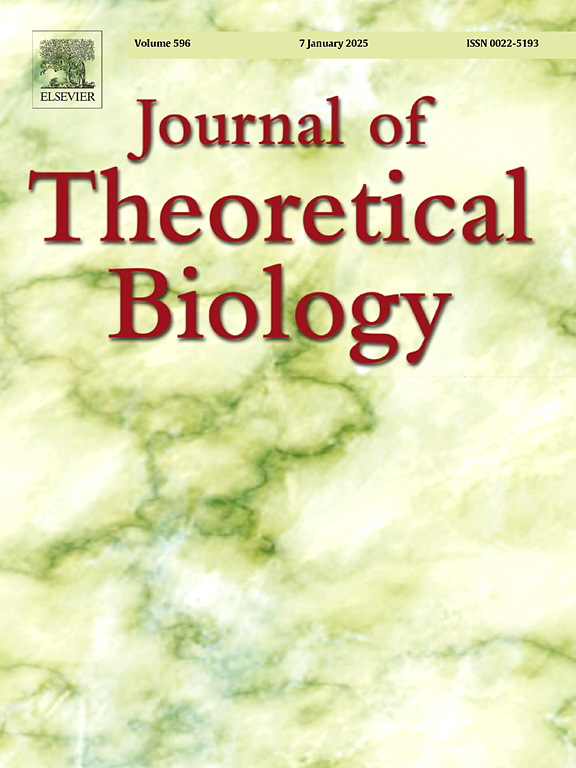Temperature variability regulates the interactive effects of warming and pharmaceutical on aquatic ecosystem dynamics
IF 1.9
4区 数学
Q2 BIOLOGY
引用次数: 0
Abstract
Climate warming and pharmaceutical contaminants have profound impacts on population dynamics and ecological community structure, yet the consequences of their interactive effects remain poorly understood. Here, we explore how climate warming interacts with pharmaceutical-induced boldness change to affect aquatic ecosystems, built on an empirically well-informed food-chain model, consisting of a size-structured fish consumer, a zooplankton prey, and a fish predator. Climate warming is characterized by both daily mean temperature (DMT) and diurnal temperature range (DTR) in our model. Results show that DMT and high levels of species’ boldness are the primary drivers of community instability. However, their interactive effects can lead to diverse outcomes: from predator collapse to coexistence with seasonality-driven cycles and coexistence with population interaction-driven cycles. The interactive effects are significantly modulated by daily temperature variability, where moderate DTR counteracts the destabilizing interactive effects by increasing consumer reproduction, while large temperature variability considerably reduces consumer biomass, destabilizing the community at high mean temperatures. Our analyses disentangle the respective roles of DMT, DTR and boldness in mediating the response of aquatic ecosystems to the impacts from pharmaceutical contaminants in the context of climate warming. The interactive effects of the environmental stressors reported here underscore the pressing need for studies aimed at quantifying the cumulative impacts of multiple environmental stressors on aquatic ecosystems.
温度变化调节着气候变暖和制药对水生生态系统动态的交互影响。
气候变暖和药物污染物对种群动态和生态群落结构有着深远的影响,但人们对其相互作用的后果仍然知之甚少。在这里,我们以一个经验丰富的食物链模型为基础,探讨了气候变暖如何与药物诱导的胆量变化相互作用,从而影响水生生态系统,该模型由大小结构不同的鱼类消费者、浮游动物猎物和鱼类捕食者组成。在我们的模型中,气候变暖的特征是日平均温度(DMT)和昼夜温差(DTR)。结果表明,DMT 和高水平的物种胆量是群落不稳定的主要驱动因素。然而,它们之间的交互作用会导致不同的结果:从捕食者崩溃到与季节性驱动的周期共存,以及与种群相互作用驱动的周期共存。这种互动效应受到日温度变化的显著调节,适度的日温度变化可通过增加消费者的繁殖来抵消破坏群落稳定的互动效应,而较大的温度变化则会大大减少消费者的生物量,从而在平均温度较高时破坏群落的稳定。我们的分析揭示了在气候变暖的背景下,DMT、DTR和胆量在调解水生生态系统对药物污染物影响的反应中各自的作用。本文所报告的环境压力因素的交互影响突出表明,迫切需要开展旨在量化多种环境压力因素对水生生态系统的累积影响的研究。
本文章由计算机程序翻译,如有差异,请以英文原文为准。
求助全文
约1分钟内获得全文
求助全文
来源期刊
CiteScore
4.20
自引率
5.00%
发文量
218
审稿时长
51 days
期刊介绍:
The Journal of Theoretical Biology is the leading forum for theoretical perspectives that give insight into biological processes. It covers a very wide range of topics and is of interest to biologists in many areas of research, including:
• Brain and Neuroscience
• Cancer Growth and Treatment
• Cell Biology
• Developmental Biology
• Ecology
• Evolution
• Immunology,
• Infectious and non-infectious Diseases,
• Mathematical, Computational, Biophysical and Statistical Modeling
• Microbiology, Molecular Biology, and Biochemistry
• Networks and Complex Systems
• Physiology
• Pharmacodynamics
• Animal Behavior and Game Theory
Acceptable papers are those that bear significant importance on the biology per se being presented, and not on the mathematical analysis. Papers that include some data or experimental material bearing on theory will be considered, including those that contain comparative study, statistical data analysis, mathematical proof, computer simulations, experiments, field observations, or even philosophical arguments, which are all methods to support or reject theoretical ideas. However, there should be a concerted effort to make papers intelligible to biologists in the chosen field.

 求助内容:
求助内容: 应助结果提醒方式:
应助结果提醒方式:


